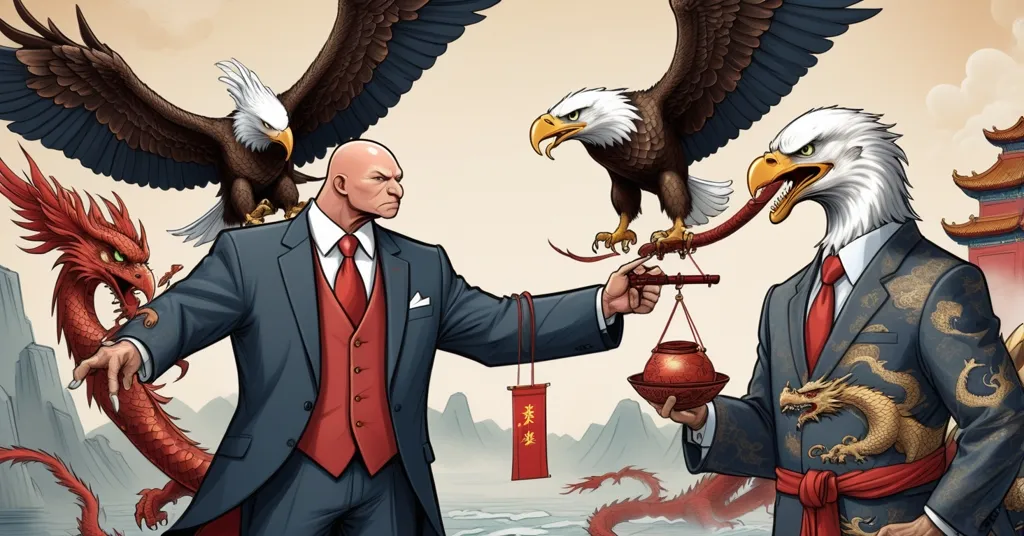Trump Demands Fair Trade with China, Citing Economic Exploitation

Trump’s Call for Fair Trade with China: Navigating Economic Tensions
Former President Donald Trump recently reiterated his strong stance on U.S.-China trade relations, emphasizing his desire for a fair deal while accusing China of economically exploiting the United States. His comments underscore ongoing tensions and highlight key issues such as trade imbalances and intellectual property theft.
- Trump seeks a fair trade deal with China.
- Accuses China of economically “ripping off” the U.S.
- Trade tensions persist between the two nations.
- Emphasizes trade imbalances and intellectual property theft.
- Reflects Trump’s broader economic nationalism.
Trump’s administration was known for its aggressive approach to U.S.-China trade, initiating a trade war marked by tariffs on Chinese goods. These measures aimed to address significant trade imbalances favoring China and the alleged theft of American intellectual property. Despite no longer being in office, Trump continues to voice concerns about these issues, driven by a policy approach known as economic nationalism, which prioritizes a country’s economic interests over global cooperation. His recent comments reflect this ongoing narrative:
I want a fair deal with China.
China is ripping us off.
The historical context of U.S.-China trade relations is one of increasing economic interdependence, yet also of growing concerns over China’s trade practices. Since China joined the World Trade Organization (WTO) in 2001, the relationship has been complex, with the U.S. becoming a major trading partner. The Trump administration’s efforts culminated in the Phase One Trade Agreement of 2020, which was intended to address some grievances but left many issues unresolved. Recent data shows the U.S. trade deficit with China has continued to grow, with U.S. exports to China falling by 2.9% and imports from China rising by 2.7% in 2024, indicating ongoing challenges in balancing trade.
The implications of Trump’s trade policies reach beyond economics, touching on strategic competition and the broader geopolitical landscape. While tariffs were aimed at pressuring China, some argue they inadvertently bolstered China’s strategic position by encouraging it to diversify trade relationships and advance its industrial policies. Sectors like aerospace, semiconductors, and electric vehicles have felt the impact of these policies, with effects ranging from increased costs to supply chain disruptions.
In the realm of intellectual property protection, Trump’s administration took significant steps, such as issuing a proclamation to block certain Chinese graduate students associated with entities supporting China’s Military-Civil Fusion (MCF) strategy from entering the U.S. This reflects a concerted effort to combat what the U.S. perceives as China’s systematic theft of intellectual property.
Trump’s call for a fair deal with China aligns with his advocacy for economic nationalism, a stance that has both supporters and critics. While some appreciate the focus on protecting American interests, others question the long-term effects on global trade relations and U.S. economic growth. As trade tensions continue, the question remains how future U.S. administrations will navigate these complex issues.
Looking forward, potential developments could include new trade agreements or policy shifts aimed at addressing the persistent imbalances and intellectual property concerns. Experts suggest that a multifaceted approach, combining diplomacy with targeted economic measures, might be necessary to achieve a more equitable relationship with China. The future of U.S.-China trade agreements remains uncertain.
Here are some key takeaways and questions to consider:
- What are the main issues Trump highlights in U.S.-China trade relations?
Trump emphasizes trade imbalances and intellectual property theft as key issues.
- What is Trump’s stance on trade with China?
Trump desires a fair trade deal and accuses China of economic exploitation.
- How do Trump’s comments reflect broader economic policies?
They align with his economic nationalism and the push for stronger trade policies to protect American interests.
- What has been the impact of U.S. tariffs on China?
Tariffs have aimed to address trade imbalances but have also led to increased costs for U.S. consumers and businesses, with mixed effects on the trade deficit.
- What are some potential future developments in U.S.-China trade relations?
Future developments might include new trade agreements or policy shifts aimed at addressing ongoing imbalances and intellectual property concerns.



